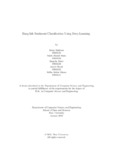| dc.contributor.advisor | Shakil, Arif | |
| dc.contributor.advisor | Rasel, Annajiat Alim | |
| dc.contributor.author | Saleheen, Abrar | |
| dc.contributor.author | Siam, Saleh Ahmed | |
| dc.contributor.author | Akter, Sanjeda | |
| dc.contributor.author | Ghosh, Akash | |
| dc.contributor.author | Ahona, Adiba Anbar | |
| dc.date.accessioned | 2023-08-09T08:29:33Z | |
| dc.date.available | 2023-08-09T08:29:33Z | |
| dc.date.copyright | 2023 | |
| dc.date.issued | 2023-01 | |
| dc.identifier.other | ID: 19101331 | |
| dc.identifier.other | ID: 19101140 | |
| dc.identifier.other | ID: 19101258 | |
| dc.identifier.other | ID: 19101425 | |
| dc.identifier.other | ID: 19101257 | |
| dc.identifier.uri | http://hdl.handle.net/10361/19372 | |
| dc.description | This internship report is submitted in partial fulfillment of the requirements for the degree of Bachelor of Science in Computer Science and Engineering, 2023. | en_US |
| dc.description | Cataloged from PDF version of thesis. | |
| dc.description | Includes bibliographical references (pages 43-44). | |
| dc.description.abstract | E-commerce websites and social media platforms have become integral parts of peo ple’s social lives. Through posts, comments, and reviews on social media and online
shopping websites, people can share their ideas. Understanding people’s opinions
and evaluating input requires the ability to classify sentiment. A variety of deep
learning methods have been employed over time to categorize sentiment. Bang-lish,
which consists of Bengali words printed in English letters, has gotten very little
notice nonetheless. In addition, the majority of Bengali-speaking individuals utilize
Bang-lish to post evaluations on e-commerce platforms. Understanding customers’
ideas are crucial for sellers who want to improve their goods. Bang-lish, however, is
challenging to understand and evaluate since it lacks a set grammar. Convolutional
neural networks (CNN) and gated recurrent units (GRU), two types of deep learning,
are combined in this study’s proposed hybrid framework. Additionally, during the
data preprocessing stage, we created a spell check algorithm for the most frequently
used words and eliminated Bang-lish stop-words. In binary sentiment classification,
our suggested model achieved 89% accuracy, 88% precision, 89% recall, and an 89%
F1 score. | en_US |
| dc.description.statementofresponsibility | Abrar Saleheen | |
| dc.description.statementofresponsibility | Saleh Ahmed Siam | |
| dc.description.statementofresponsibility | Sanjeda Akter | |
| dc.description.statementofresponsibility | Akash Ghosh | |
| dc.description.statementofresponsibility | Adiba Anbar Ahona | |
| dc.format.extent | 44 pages | |
| dc.language.iso | en | en_US |
| dc.publisher | Brac University | en_US |
| dc.rights | Brac University theses are protected by copyright. They may be viewed from this source for any purpose, but reproduction or distribution in any format is prohibited without written permission. | |
| dc.subject | Sentiment classification | en_US |
| dc.subject | Spell corrector | en_US |
| dc.subject | Hybrid model | en_US |
| dc.subject | Convolutional Neural Network | en_US |
| dc.subject | Gated recurrent unit | en_US |
| dc.subject.lcsh | Machine learning | |
| dc.subject.lcsh | Cognitive learning theory (Deep learning) | |
| dc.title | Bang-lish sentiment classification using deep learning | en_US |
| dc.type | Thesis | en_US |
| dc.contributor.department | Department of Computer Science and Engineering, Brac University | |
| dc.description.degree | B. Computer Science and Engineering | |

